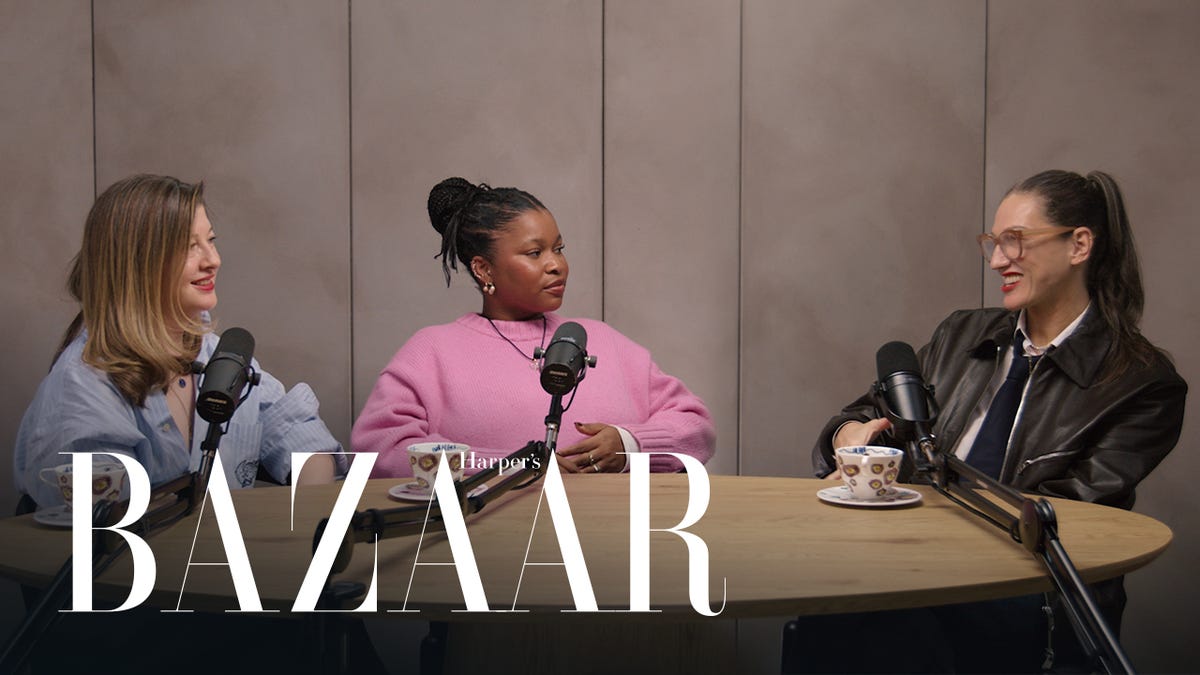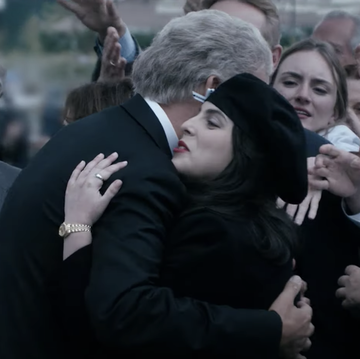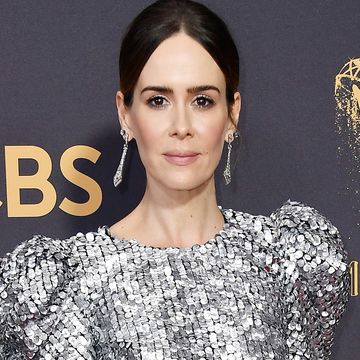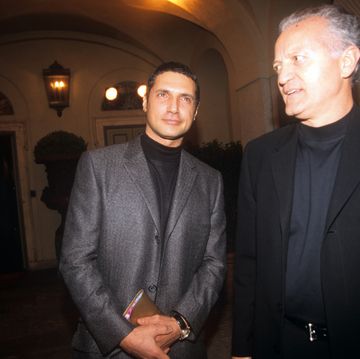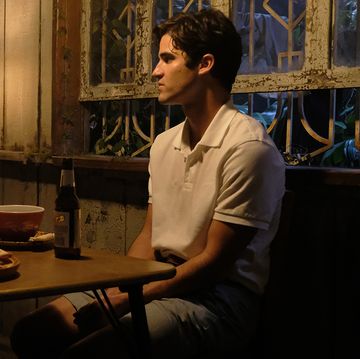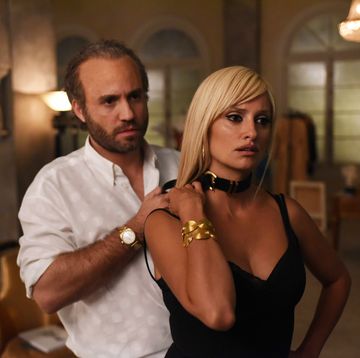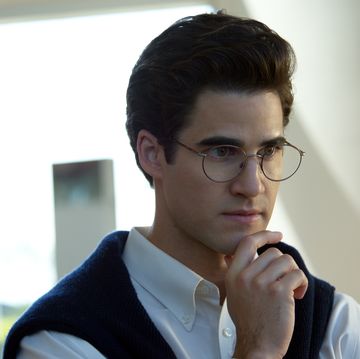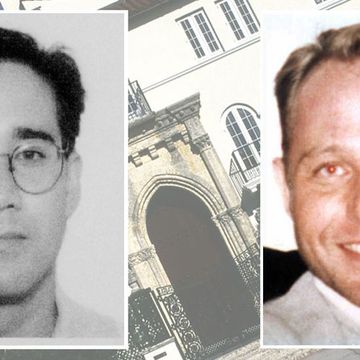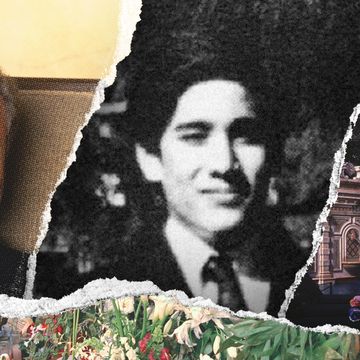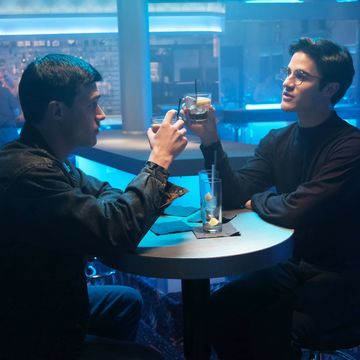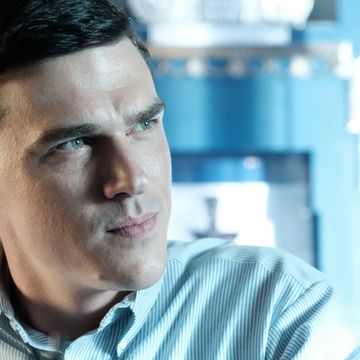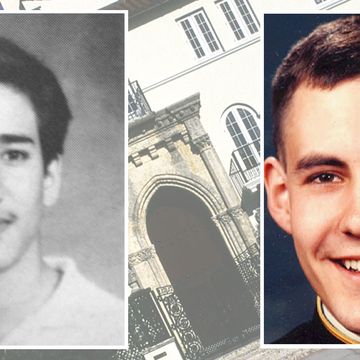The Assassination of Gianni Versace returned to the present-day—that is, July 1997—for its final episode, revisiting Gianni Versace's death and depicting Andrew Cunanan's final hours with a touch of melodrama and some serious liberties with the truth. The finale brought back several familiar faces, returned to that controversial Episode 1 dream sequence, and ended on a rather dull note following weeks of bloodshed, fashion and over-the-top theatrics.
Here, six things to note from the season finale of The Assassination of Gianni Versace: American Crime Story, "Alone."
1) Versace's murder opens this episode, too.
Like the season premiere, the finale begins with the moment around which the series revolves. But unlike the Technicolor, dream-like rendering of Versace's murder in Episode 1, this sequence is depicted from Cunanan's perspective. After he shoots Versace, Cunanan stares down at the designer's body with a look that's almost victorious. His face seems to say, "This time, I won."
Cunanan celebrates by breaking into a houseboat to camp out. He pops a bottle of champagne (timed to a TV news report's graphic description of Versace's murder) and watches his own face light up the screen. This is the most relaxed we've ever seen Cunanan, so much so that it's almost unbelievable—Darren Criss looks like a supermodel in this sequence. As helicopters comb Miami Beach on the hunt for the fugitive, Cunanan settles into a deck chair to watch. He's finally garnered the fame he's always craved.
2) Marilyn Miglin and Ronnie become crude mouthpieces for showcasing the police's inefficiency.
Here's a face I never expected to see again. American Crime Story shows Marilyn Miglin (Judith Light), widow of Cunanan victim Lee Miglin, in Tampa at the time of the Cunanan manhunt, though there's no evidence to suggest this was the case in real life. When the cops arrive at her hotel room to ask her to leave the state, she attacks, accusing the cops of failing to do their jobs.
"How many more are going to die? How much more pain do you think I can suffer? Two months. You had two months. You had his name, his photo, what did he have? The money he stole from Lee. What has he been doing for two months? What have you been doing?"
Later, the cops pick up Cunanan's old pal Ronnie (Max Greenfield) for questioning. He delivers a similar diatribe, but blames police homophobia for the failure to capture Cunanan. Ronnie addresses the only woman on the case, Detective Lori Wieder (Dascha Polanco), and acknowledges that she did her homework. "But the other cops here, they weren't searching so hard, were they? Why is that? Because he killed a bunch of nobody gays?" When the other detective (José Zúñiga) protests, Ronnie goes off: "You know what the truth is? You were disgusted by him long before he became disgusting."
For a show that promised to navigate how homophobia affected the police's failure to capture Cunanan, these scenes feel like afterthoughts. The show's reverse-chronological framing device rendered it more like a biopic of Andrew Cunanan than a thoughtful examination of the authorities' unsuccessful search for a spree killer targeting gay men. Episode 2 and Episode 4 both touched on the subject, but not enough to feel impactful, so instead of powerful commentary, these finale scenes serve only as a suggestion of what could have been.
3) As his loved ones abandon him, Cunanan's narcissism also gets the best of him.
The honeymoon is over for Cunanan. After evading the police for several days, the fugitive has had one too many close calls. Back at his houseboat, he watches the television reports with increasing dread. His best friend Elizabeth (Annaleigh Ashford) tapes a televised plea, and it seems to shake Cunanan for a moment. Later, when David Madson's father gives an interview, Cunanan can't take it anymore. He'd turned on every television in the house to revel in his newfound celebrity, but now, he's surrounded by the face of the man he loved—and the voice of that man's father. He runs frantically through the house to shut off the TVs, but his desperation only grows. He's never felt so alone.
His salvation comes, for a moment, from an unlikely source—Marilyn Miglin. Cunanan catches an infomercial in which Miglin reminisces about happy memories of her late father. It's an odd scene that serves a much-too-neat purpose: inspiration for Cunanan to call his own father (Jon Jon Briones) in the Philippines. He's utterly desperate at this point, begging his father to come get him. Overjoyed at the sound of his son's voice, Modesto promises to fetch his son from Miami in 24 hours. But the next day, while awaiting his father's arrival, Cunanan catches news footage of Modesto discussing the movie rights to his own life story. He's devastated. His father's not coming, and now, he has no one and nothing left.
4) The moment of Cunanan's death returns to that baffling scene in the opera house.
Cunanan is eventually discovered squatting in the houseboat, and a standoff with the police ensues. As the authorities enter the house, Cunanan shoots himself in the mouth, but not before taking one final glance in the mirror. As the gunshot goes off, Cunanan's voiceover ironically declares, "I'm so happy right now."
We're back at the opera house, in that much-debated scene from Episode 1. Cunanan's realizing this miraculous interaction with Versace is his make-or-break moment. "What if you had a dream your whole life that you were someone special, but no one believed it?" he asks the designer. "And then, what if the first person that truly believed you was the most incredible person you'd ever met?" Versace counters: "It's not about persuading people you're going to do something great. It's about doing it." And that, of course, is what ultimately separates Versace from Cunanan.
It's here that this scene shifts from too-good-to-be-true dream sequence to cold reality. Versace encourages Cunanan to finish his novel (remember that?) but Cunanan jumps at the chance to prove himself to his idol, offering to work as Versace's assistant. Now, Versace balks, and their connection is tarnished. Opportunistic as ever, Cunanan tries to kiss Versace in a final, desperate bid for affection and validation. Versace kindly rebukes him, with the promise of dinner "another night." Cunanan is left alone, as the lights onstage go dark. The scene ends with the sound of the gunshot, implying that Cunanan's most devastating rejection is also his final, conscious thought.
5) American Crime Story's version of Antonio D'Amico depicts a suicide attempt.
A truly baffling plot point in tonight's episode comes by way of Antonio D'Amico (Ricky Martin) and the Versace family. It's well known that in real-life, Donatella did not really like her late brother's partner and effectively iced him out of the family. In this episode, Donatella (Penelope Cruz) hints to D'Amico that she intends to eventually evict him from the home he shared with Gianni (according to the real-life D'Amico, there were tensions with Donatella about what was left to him in Versace's will). Later, at Gianni's funeral, the priest neglects to mention D'Amico and shrugs off his hand with a scowl. So far, so believable. But the episode takes a turn in its final moments, as D'Amico is shown swallowing a handful of pills. Moments later, a maid finds his barely conscious body. Though the real-life D'Amico has said that his partner's death sent him into a deep depression, there is no evidence to suggest he ever attempted suicide in real life; D'Amico is alive and well today, and it's appalling that the show neglects to acknowledge that.
6) In death, Cunanan becomes a footnote to Versace's legacy.
For a show so obsessed with appearances, its final moments are quite anticlimactic. As Donatella mourns at Gianni's lavish grave and the maid discovers D'Amico on the floor, an unnamed cemetery worker lays Cunanan's cremated remains to rest, a pointed metaphor for Cunanan's insignificance within the shadow of Versace's legacy.

